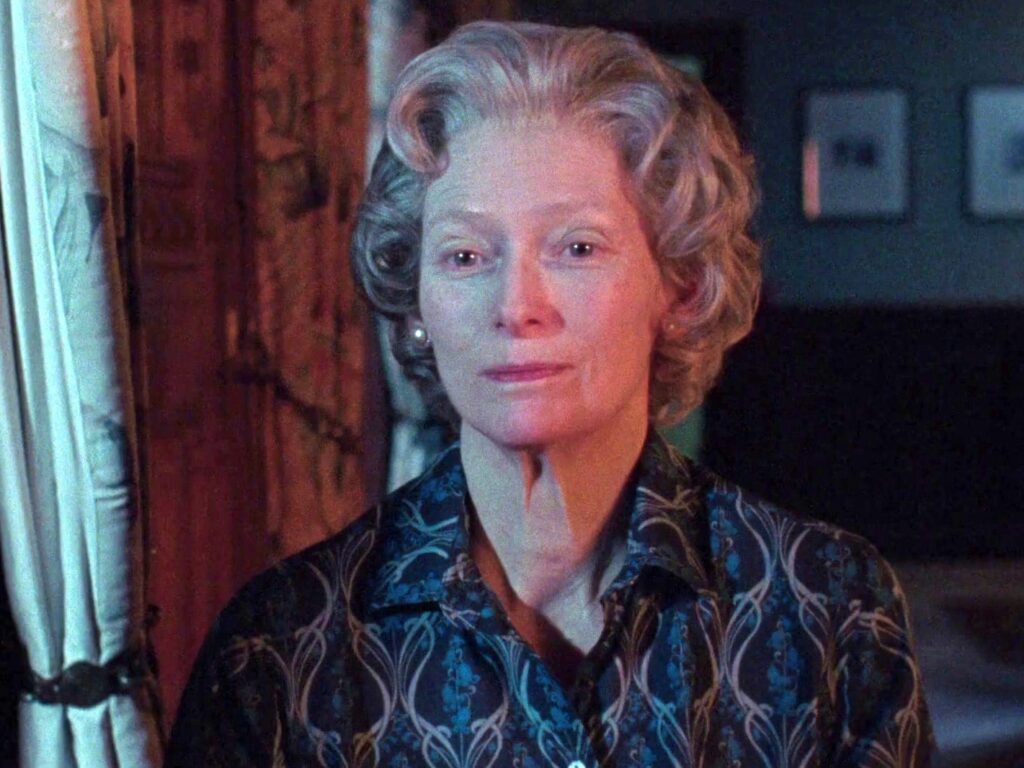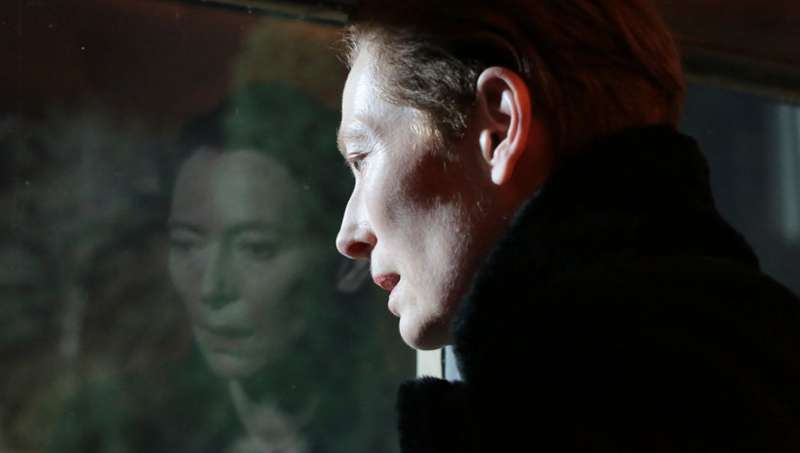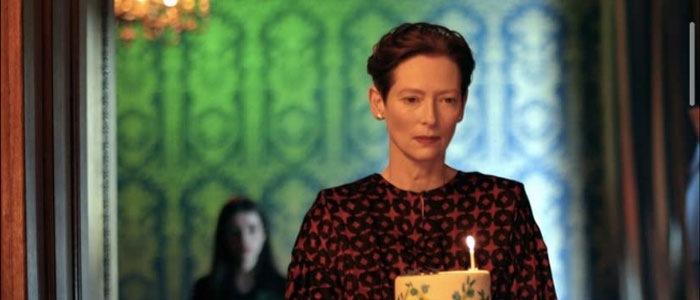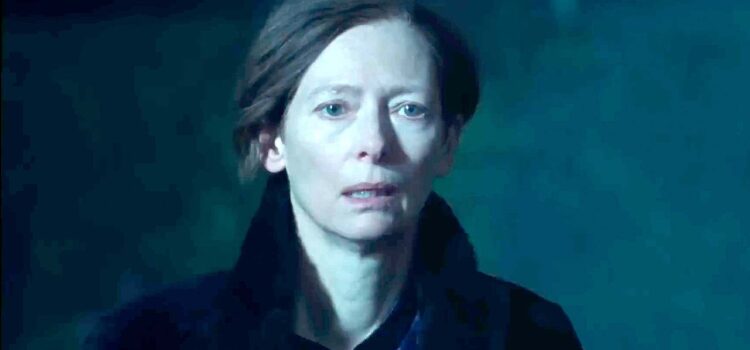By Alex McPherson
Moody, enigmatic, and unnerving, director Joanna Hogg’s “The Eternal Daughter” is a stylistically ingenious ghost story — featuring Tilda Swinton in dual roles — albeit one that doesn’t land all the emotions it aims for.
The film centers around Julie Hart (Swinton), a filmmaker traveling with her mother, Rosalind (Swinton, with a luscious wig), and her adorable dog, Louis (Swinton’s actual dog), to a countryside hotel in Wales to celebrate Rosalind’s 80th birthday and to surreptitiously write a screenplay inspired by Rosalind’s life.
Rosalind used to spend time at this sprawling estate as a child when her Aunt Jocelyn owned the building during World War II; she associates memories of both joy and sadness within the aged walls. Still, however, the hotel isn’t exactly the most inviting abode — surrounded by jagged woodlands and perpetually draped in a thick fog that threatens to consume anyone within reach. The blustering wind howls through the foundation like a spirit’s cry for help and release.
Upon arrival late one evening, Julie and Rosalind appear to be the sole guests staying there — with only a hilariously passive aggressive receptionist (Carly-Sophia Davies) to greet them. Julie has other things to worry about. These include being able to learn more about the woman she’s spent so much time trying to connect with, yet knows so little about, who she’s mining for her own creative endeavors.
Their usually banal interactions about Rosalind’s experiences, or what to simply order for dinner, allude to deeper anxieties and insecurities. Additionally, whenever Julie tries to focus and write, she’s interrupted by strange noises emanating from somewhere in the hotel, as if the building itself is a living entity trying to dissuade her project.

A mystifying tale ensues, but Hogg (whose previous filmography includes the somewhat autobiographical “Souvenir” films) isn’t interested in scaring viewers. Rather, “The Eternal Daughter” uses its eerie atmosphere to explore themes of grief, acceptance, and the creation of art itself — of how it works as a preservation of memory and a means to confront life’s challenges.
“The Eternal Daughter” thrives off slow-burn paranoia that immerses viewers into Julie’s increasingly disoriented headspace. From ominous bumps on the floor above, to machines suddenly whirring to life, and doors literally groaning as they shut behind Julie, Hogg succeeds at creating an off-kilter environment that keeps viewers on edge.
Jump scares are nowhere to be found. Rather, thanks to tactile sound design, distanced yet meticulous cinematography by Ed Rutherford dripping in gothic stylings, and a creepily melodic score by David Saulesco, “The Eternal Daughter” is a psychological chiller that has absolutely no qualms about alienating viewers with short attention spans. It’s deeply immersive from start to finish — letting viewers cautiously wander Julie’s unfamiliar surroundings with her, as she slowly searches for some unknown source that grips her thoughts.
Of course, Swinton’s performances (as both Julie and Rosalind) are exemplary: understated and subtle. Julie’s a tormented character — immersed in her filmmaking work, to the detriment of her social life, without children of her own, and grappling with the reality that Rosalind won’t be with her much longer. She also feels guilty about secretly recording their conversations, “intruding” where she feels she doesn’t belong. Swinton captures Julie’s high-strung demeanor while also showing the widening cracks in her facade.

Rosalind, on the other hand, is concerned about Julie, but keeps her true feelings subdued — illuminated in brief remarks that, despite their plainness, hit the sensitive Julie like a truck. The bizarre nature of the casting decision quickly fades away, as Swinton fully inhabits both characters and renders them distinct, yet cut from the same cloth nevertheless. It underscores the idea of Julie being unable to separate herself and her well-being from her mother — for better and worse, she struggles to accept the inevitable.
Hogg’s screenplay succeeds (for the most part) at weaving dark comedy and pathos into the proceedings — the aforementioned receptionist’s weirdly aggressive reactions provide much of the comic relief, as does Louis, one of the best canine actors in the business. A benevolent groundskeeper named Bill (Joseph Mydell), on the other side of the spectrum, exudes warmth and kindness. He stays in touch with his late wife via memories associated with each room in the big house, and tunes us into Hogg’s grand schemes.
A central theme of “The Eternal Daughter,” in fact, revolves around the ways we stay connected to loved ones who pass, and the ways that self-expression can function as a way to free ourselves of regret and make peace with the past. Julie, in trying to finally connect on a deeper level with her mother, must also confront her own tormented psyche, and art provides a prime medium to do so.
Hogg isn’t a stranger to such themes in her work, but “The Eternal Daughter” feels distinct in the way she crafts a full-blooded ghost story out of (somewhat pretentious) themes. Indeed, by lingering so much on unusual, seemingly minute details, “The Eternal Daughter” is a puzzle box that begs to be solved. The editing, cinematography, dialogue, and music all contribute to an overarching narrative that’s quietly complex. Hogg encourages patience and close inspection — building towards a reveal that’s suitably bewildering.
The film’s construction also works to its detriment, though. By seeming so impenetrable, at least on first viewing, “The Eternal Daughter” sacrifices heft that prevented me from becoming emotionally wrapped up in Julie’s ultimately small-scale story. The effort the film requires to unpack doesn’t quite equal the payoff, rendering it more satisfying as a conceptual experiment than a gripping narrative. Still, though, for arthouse-inclined viewers, “The Eternal Daughter” will captivate, confuse, and leave them hungering for whatever Hogg has in store next.

“The Eternal Daughter” is a 2022 drama-mystery directed by Joanna Hogg and starring Tilda Swinton, Carly-Sophia Davies. It is rated PG-13 for some drug material and the runtime is 1 hour, 36 minutes. It opened in theaters on Dec. 2 and is available on Video on Demand. Alex’s Grade: B+
Alex McPherson is an unabashed pop culture nerd and a member of the St. Louis Film Critics Association.

